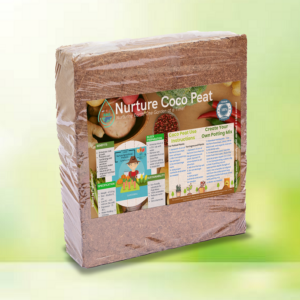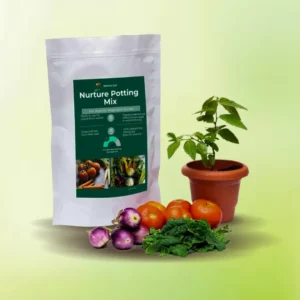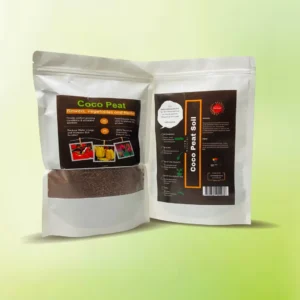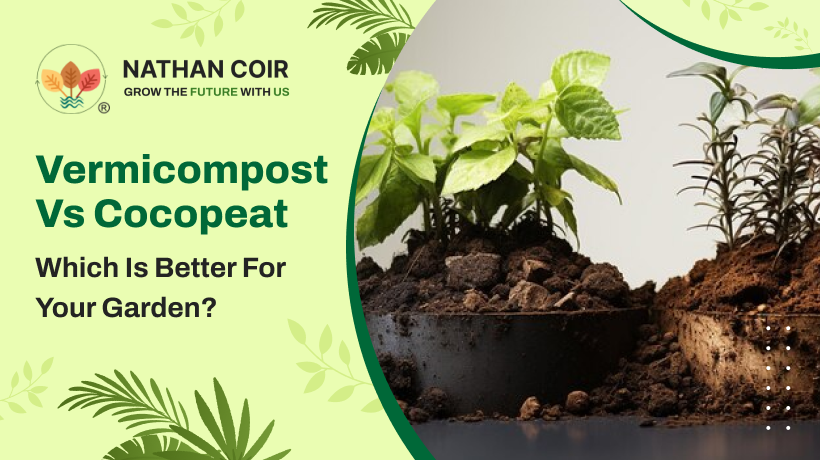Gardeners are often confused as to what soil amendments to choose. Vermicompost and cocopeat remain the two most popular options for many gardeners. The two have distinctive advantages, but which one is best suited for your garden? In this article, we will compare vermicompost and cocopeat in terms of their main features, advantages, and disadvantages, and how they can be well utilized in gardening. By doing so, you will have a better understanding of what option is ideal for your gardening needs.For convenient online shopping, you can buy coco peat soil online.
Introduction
Soil quality is key to promoting plant growth, and vermicompost and cocopeat are two popular organic amendments with distinct benefits. Understanding the differences between them is essential for making an informed decision. In this post, we’ll explore how these substances can improve plant health and help you choose the best option for your garden, whether you’re a seasoned gardener or just starting.
Comparing Vermicompost and Cocopeat: Key Factors
What is Vermicompost?
Vermicompost, a type of organic fertilizer, is produced during the composting process by earthworms. These worms break down the organic materials, producing a nutrient-rich humus that is perfect for boosting soil fertility. Vermicompost is rich in essential nutrients for plant growth, including nitrogen, phosphorus, and potassium. Additionally, it has beneficial microorganisms that improve soil structure and encourage healthy root growth.
What is Cocopeat?
Cocopeat, also known as coir pith, is a naturally occurring byproduct of the coconut husk. Because of its remarkable ability to retain water, it is highly prized and commonly used in place of peat moss. Cocopeat, a light, spongy material, aerates the soil and ensures that plant roots receive adequate oxygen. It also maintains a steady moisture level in the soil, which is beneficial for plants that require frequent watering. Although it doesn’t provide as many nutrients as vermicompost, cocopeat can be mixed with other soil amendments to create the perfect growing media.
Pros and Cons of Vermicompost vs. Cocopeat
Pros of Vermicompost
Rich in Nutrients: Vermicompost is packed with essential nutrients that improve soil fertility and promote healthy plant growth.
Improves Soil Structure: It helps improve soil aeration, drainage, and water-holding capacity.
Environmentally Friendly: Being an organic material, it is a sustainable and eco-friendly option for soil enhancement.
Cons of Vermicompost
Costly: Due to the labor-intensive process of production, vermicompost tends to be more expensive compared to other soil amendments.
Requires Proper Storage: Vermicompost should be stored in a cool, dry place to prevent it from decomposing or attracting pests.
Not Suitable for All Plants: Some plants, particularly those that prefer a more acidic soil environment, may not benefit from the high nutrient content of vermicompost.
Limited Availability: Vermicompost may not always be readily available in local stores, especially in larger quantities, making it less convenient to obtain.Risk of Over-fertilization: Since vermicompost is nutrient-rich, using it in excess can lead to over-fertilization, which may harm certain plants by burning their roots.
Pros of Cocopeat
Excellent Water Retention: Cocopeat can hold up to 10 times its weight in water, making it ideal for plants that need consistent moisture.
Lightweight and Easy to Handle: Cocopeat is much lighter than traditional soil, making it easier to work with, especially in containers and raised beds.
Improves Soil Aeration: Cocopeat provides excellent drainage, preventing root rot and ensuring that plant roots receive sufficient oxygen.
Sustainable: Cocopeat is a renewable resource made from coconut husks, making it an eco-friendly option.
Cons of Cocopeat
Low Nutrient Content: Cocopeat does not provide significant nutrients on its own, which means it needs to be combined with other soil amendments like Potting Mix or fertilizers to ensure plant growth.
High Salt Content: Some cocopeat products contain high levels of salts, which can harm plants if not properly rinsed before use.
How to Use Vermicompost and Cocopeat in Your Garden?
How to Use Vermicompost?
Vermicompost can be put directly into the soil or mixed with other organic ingredients. As a top dressing, it is commonly applied as a thin layer that is gently rubbed into the soil’s surface. Before planting, it can also be combined with the soil to add nutrients. Vermicompost can be added to potting soil for container gardening to increase its nutrient content and encourage strong plant development. It is often advised to incorporate 10–20% vermicompost into your soil mixture.
How to Use Cocopeat?
Cocopeat is typically added to soil or used as the primary growing medium in container gardening. It can be combined with vermiculite, compost, or perlite to improve aeration and drainage. For seed starting, seed trays can be filled with cocopeat, a lightweight, moisture-retaining substance.
Cocopeat is also frequently utilized as a soilless growing medium in greenhouses and in hydroponic systems.
Which is Better for Your Garden?
Cocopeat is often a better option than vermicompost for gardeners who wish to enhance soil aeration, water retention, and the conditions for plant roots to drain correctly. It is especially beneficial for container gardening, raised beds, and plants that require continuous watering. Cocopeat is a favorite among gardeners of all skill levels because it is lightweight, sustainable, and controllable.
Combining vermicompost with cocopeat often yields the best results. When you combine the two, you get the nutritional benefits of vermicompost and the moisture retention and aeration properties of cocopeat.
Choosing between coco peat and peat moss can greatly affect your gardening success. For a comprehensive guide to help gardeners select the perfect growing mediums, check out our Gardener’s Guide.
Conclusion
Both vermicompost and cocopeat offer unique advantages, but when it comes to optimizing moisture retention, aeration, and sustainability, Nathan Coir Cocopeat stands out as the top choice. While cocopeat is excellent for enhancing water retention and aeration, vermicompost excels at providing essential nutrients and improving soil structure. However, Nathan Coir Cocopeat combines these benefits seamlessly, making it the ideal option for a wide range of gardening needs.
For gardeners seeking the best quality, you can buy the coco peat 2L pack online at Nathan Coir. Choose Nathan Coir for your gardening needs and experience exceptional results!




